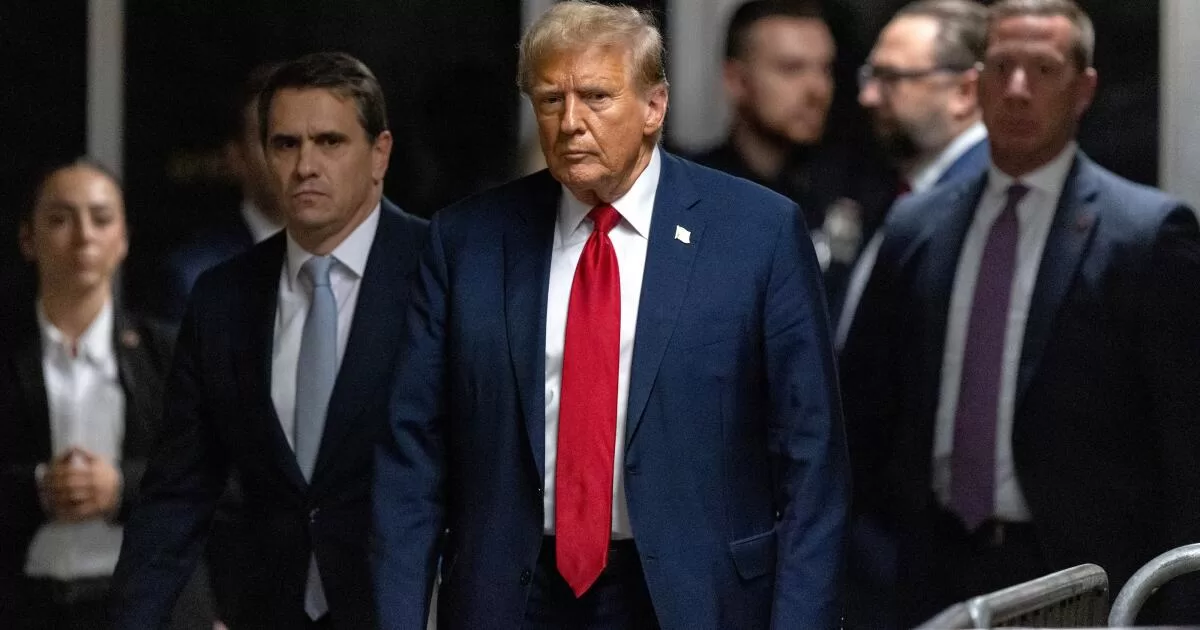By Thursday, he was complaining about the overlap in his busy legal schedule, railing that Judge Juan M. Merchan, who is presiding over his hush-money case in New York, wouldn’t let him leave that trial to attend a Supreme Court hearing in Washington, D.C., over whether he can face criminal prosecution for trying to overturn the 2020 election. That decision also could affect Trump’s classified-documents case in Florida.
“I should be there!” Trump fumed about the Supreme Court. “He wouldn’t allow it to happen. He puts himself above the Supreme Court.”
Most of the week, Trump sat in Merchan’s Manhattan courtroom as former National Enquirer Publisher David Pecker testified. Pecker, a key witness in the 34 felony counts of falsifying business records, helped prosecutors outline the alleged conspiracy that involved using the tabloid to kill negative stories about Trump and covering up payments during the 2016 campaign.
A trial break Wednesday might have offered a reprieve for Trump. Instead, it was full of more action against the former president. Trump was identified as a co-conspirator in two states: Michigan, during a pretrial hearing involving a group of “fake electors” who were charged as part of an election subversion scheme; and Arizona, where some of Trump’s closest allies were charged in yet another plot to overturn the election using fake electors.
That indictment hit close to Trump because it included Mark Meadows, his former chief of staff, and Rudy Giuliani, the former New York mayor who became Trump’s political fixer and confidant.
It didn’t end there. By the time Trump got back to court on Thursday, prosecutors alleged that his attempts to spin perceptions about his Manhattan case — including calling Pecker “a nice guy” — violated the gag order because he was trying to sway a potentially harmful witness.
To cap it off, a federal judge in New York rejected Trump’s attempt to throw out an $83.3-million civil defamation judgment for E. Jean Carroll, a former magazine columnist who accused Trump of raping her in a department store in the 1990s. A jury ruled Trump defamed Carroll by denying her sexual-abuse allegations.
Will it matter in the election? Trump appeared unharmed during the presidential primary, with many Republican voters either dismissing the charges as a distraction or agreeing with Trump that he was being persecuted for upending the establishment.
In interviews last week with voters in Arizona, a key swing state, one supporter dismissed the fury around Trump’s actions on Jan. 6, 2021, as overblown. Other supporters and potential supporters said their concerns about the economy and immigration and frustration with President Biden were more important than anything else.
But a poll released Wednesday had some data that might concern Trump’s campaign. Six in 10 voters said the charges in the Manhattan case — considered the weakest of the four indictments against the former president — were either very serious or somewhat serious, according to a Quinnipiac University poll of registered voters.
Just under half of those polled said Trump did something illegal, while more than a quarter said it was unethical but not illegal.
Most voters said a conviction would not influence their vote. But a sizable minority — including 5% of Trump voters — said they would be less likely to vote for Trump if he is found guilty.
That may not seem like much, and some of those voters could change their minds. But in an election that both sides expect to be close, even a relatively small number of lost votes could matter.
“Any slice of 2% to 3% of people who will be persuaded matters,” said David Paleologos, a pollster and director of the Suffolk University Political Research Center in Boston.
There’s also an opportunity cost, as Trump is losing time to get out in front of swing-state voters.
“The only way a week like this is reversed is if he has a positive outcome in one of his trials,” Paleologos said.
For Trump, a positive result could include not only an outright win but also a ruling by the Supreme Court that delays one or more of his trials until after the election, allowing him to further scuttle or quash the proceedings if he becomes president again.
“It’s one thing to be tied up in court a week and then win,” Paleologos said. “And it’s another to have lost all of that time and lose.”
